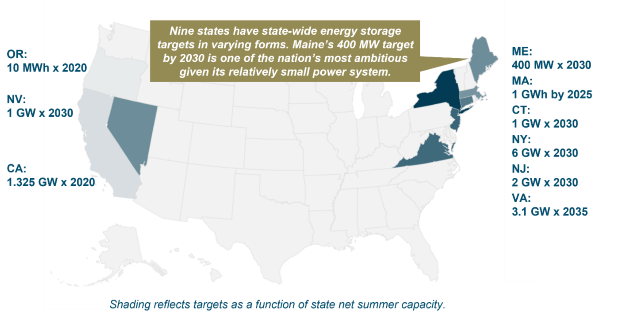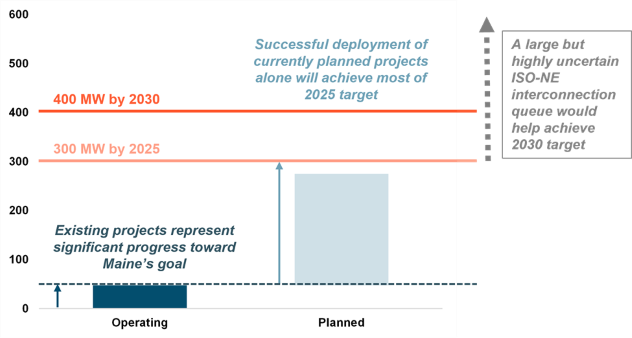In 2021, Governor Mills signed L.D. 528, bipartisan legislation that directed the assessment of Maine’s energy storage market and established energy storage goals of 300 megawatts of installed capacity within the state by the end of 2025 and 400 megawatts by the close of 2030. These targets established Maine as the ninth U.S. state with codified energy storage targets, targets that are some of the most ambitious in the country given the relative size of the state’s electricity load with 400 megawatts representing nearly 20 percent of Maine’s peak electricity demand in 2021.

The Governor’s Energy Office (GEO) retained Energy & Environmental Economics (E3) to complete the Energy Storage Market Assessment, a consultancy with extensive experience providing technical analysis to clients across all sectors of the electricity industry including utilities, regulators, policy makers, developers, and investors.
Read the Maine Energy Storage Market Assessment (PDF)
The report reviews the opportunities and challenges faced by the state in achieving its energy storage goals. It evaluates current and emerging storage technologies, assesses the market and policy landscape and hurdles to deployment, and includes a cost-benefit analysis of certain storage applications. E3, with support from the GEO, engaged with more than 100 stakeholders representing utilities, industry, customers, state legislators, regulators, environmental groups, and other interested parties who participated through public webinars and by sharing feedback that informed study development.
In 2020, the state’s four-year climate action plan, Maine Won’t Wait, identified storage as an important factor in achieving emissions reduction goals and maximizing the value of renewable energy on the grid. This study underlines energy storage as a vital complement to the state’s broader climate and clean energy targets, particularly as Maine increases its use of renewable energy generation and electrifies transportation and buildings to support its decarbonization goals.
The study shows that both grid-connected storage and customer-sited storage have the potential to provide many benefits to Maine’s electric grid and customers, particularly through the ability to shift electricity from when it is generated to when customers need it most. Storage can help lower wholesale electricity costs, lower utility infrastructure costs, and lower electricity bills while increasing resiliency and helping integrate more renewable energy.
The study also notes that Maine is already on its way toward meeting its ambitious targets with 50 megawatts of storage capacity operating in the state at the beginning of 2022 and hundreds of megawatts of additional planned projects in the ISO-NE interconnection queue.

Webinars
E3, in coordination with GEO, hosted webinars to solicit input on preliminary study results, data, and scenario design, and to present the final study results. All webinars were open to attendance by the public. Relevant materials from each webinar are posted below.
Stakeholder Session #3 - March 28, 2022
Date: March 28, 2022
Time: 1:00 p.m. – 2:00 p.m.
Location: Virtual meeting – WebEx
Contact Name: Caroline Colan
Contact Phone: (207) 530-7368
Stakeholder Session #2 - February 14, 2022
Provide feedback to the study team (requested by COB February 16, 2022)
Date: February 14, 2022
Time: 1:00 p.m. – 2:00 p.m.
Location: Virtual meeting – WebEx
Contact Name: Caroline Colan
Contact Phone: (207) 530-7368
Stakeholder Session #1 - January 10, 2022
Provide feedback to the study team (requested by January 18, 2022)
Date: January 10, 2022
Time: 1:00 p.m. – 2:00 p.m.
Location: Virtual meeting – WebEx
Contact Name: Caroline Colan
Contact Phone: (207) 530-7368